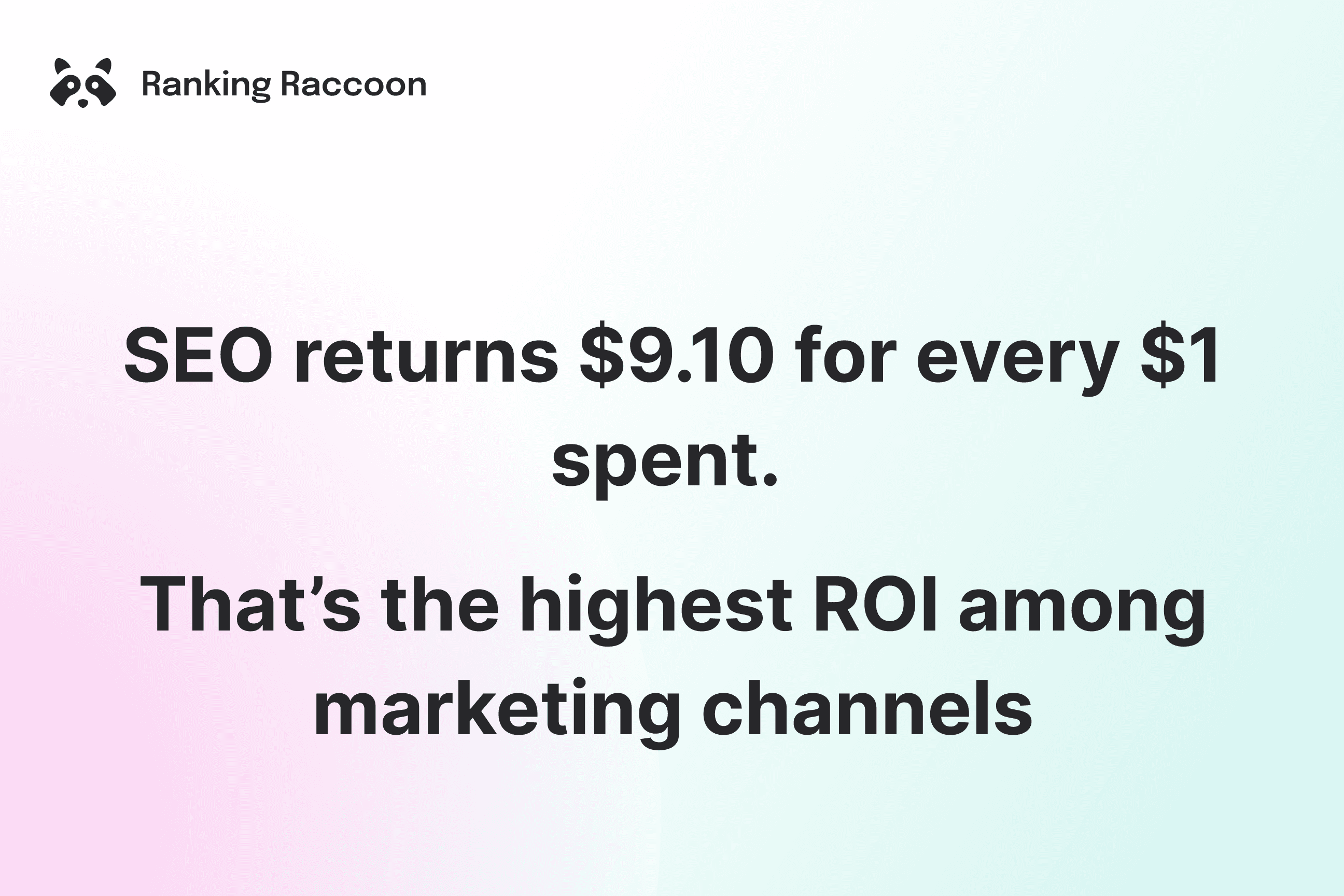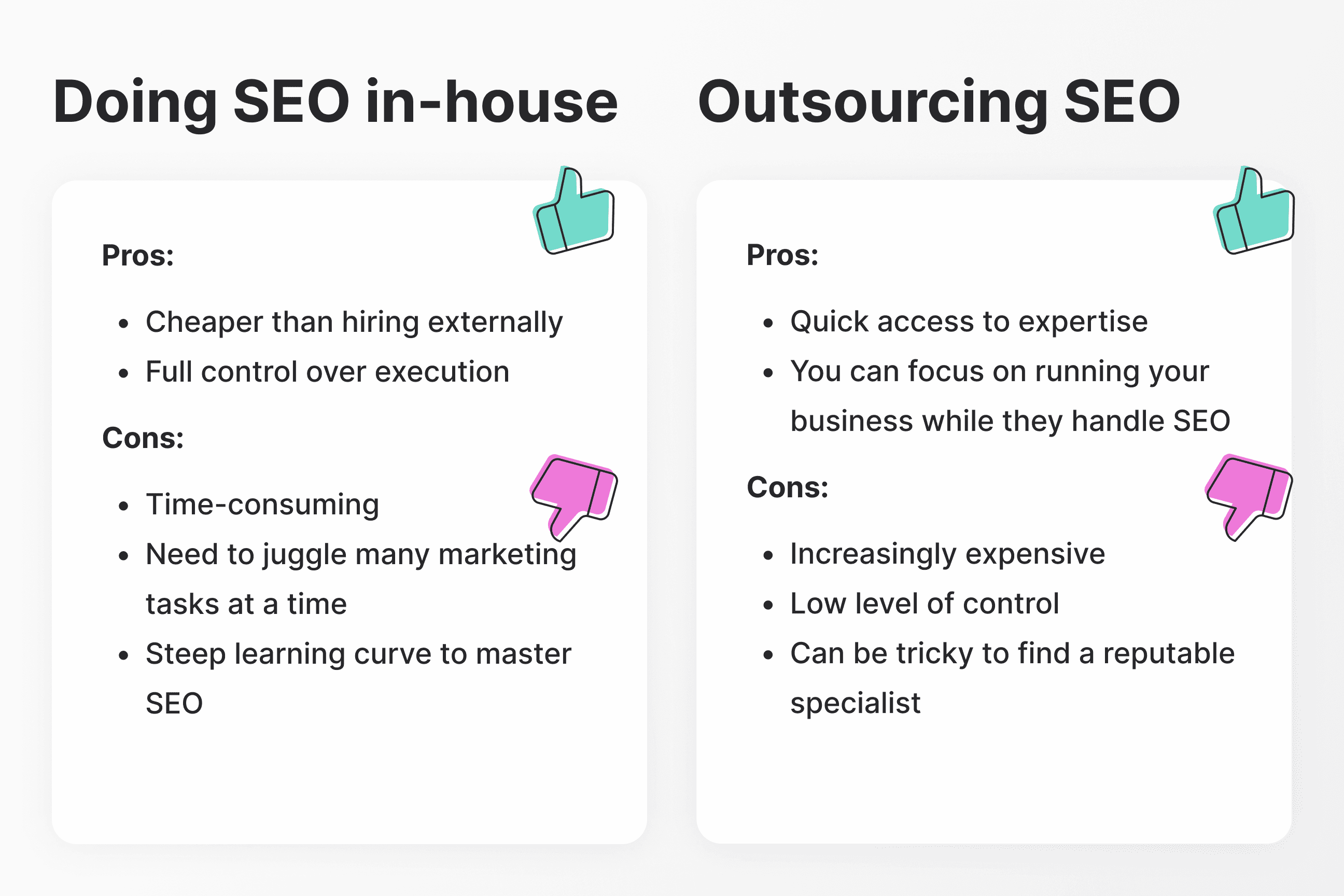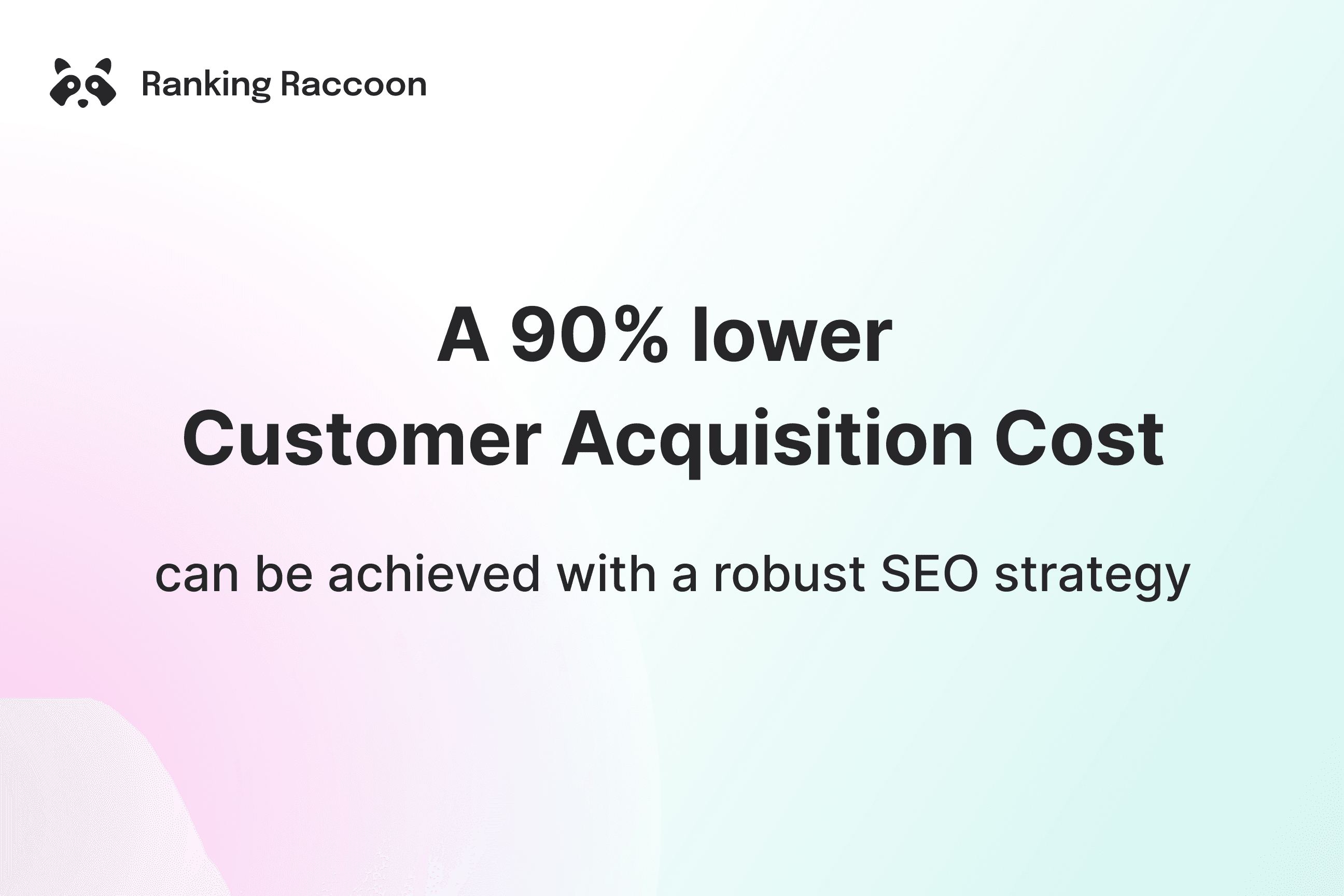How and Why do SEO as a Startup? 6 Hacks (+Insights from 10 Founders)

Natalia Toth
Starting a business? Welcome to the grind. You've got a lean team, big dreams, endless to-do lists, and dozens of marketing channels that you could tip on for growth.
But if there’s one channel you shouldn't skip — it’s SEO. That’s right, SEO for startups is the underdog hero of digital marketing.
Let’s break down if SEO's worth it for startups, sprinkle in some real-life advice from 10 founders, and show you how to master SEO without draining your budget with 6 simple hacks. Scroll down to the FAQ section for quick answers.
SEO for startups is a no-brainer… Or is it not?
Many founders wonder,
"Is SEO even worth it this early?"
Forums are bustling with discussions about whether startups should invest in SEO at all - and according to many users, you should.
- “If you ignore SEO now, you’re only creating more work for yourself later. It’s like skipping leg day at the gym — it’ll catch up with you."
- “SEO is often neglected by early-stage startups due to its delayed gratification nature.This can be especially true for VC-backed startups that have a ton of pressure to grow immediately. But if you do SEO right, the cost of customer acquisition can end up being much lower than other channels.”
- “It all depends on the industry - different channels work better for different industries andit's your job as an owner to figure that out.”
Here's the thing: SEO isn’t just about ranking on page one tomorrow—it’s about planting seeds for sustainable, long-term growth.

What's experts' take on this? As international SEO consultant Jairo David Guerrero Vasquez puts it,
‘SEO is the real deal for growth. It is the most sustainable and scalable channel. SEO is the only channel that brought +7 revenue figures per year with the highest ROI. Nothing can beat search engines as sales channel, yet.’
Here’s what Kaustubh Katdare, a growth marketer with 15 years of experience in SEO and Founder at Jatra, shared with us about the role of SEO for early-stage startups:
‘SEO has been a top growth driver for startups for over a decade. It attracts potential customers who are already searching for solutions the startup offers.
Startups investing in SEO are playing the long game — it's a high ROI investment. While SEO might take a few months to gain traction, that’sexactly when startups should engage with customers, learn their pain points, and refine their content strategy.’
We asked the Product Hunt community if they do SEO for their startups. Pierre-Yves Dubreucq, Co-Founder & CTO of Sweego and Mindbaz, was the first to answer:
'Not having an SEO strategy is a mistake. The long-term results can be very rewarding. You need to stay updated on industry trends and continuously improve your content, but it's definitely worth the effort.'
Some founders stressed the key role of SEO for bootstrapped startups:

Others believe that SEO ensures your long-time visibility, even if it takes time to show impact:

Others advise to start with keyword research and on-page optimization:

But doesn’t AI make SEO outdated?
SEO is still far from dying out, even with all the hype around AI tools like ChatGPT, Gemini, and the launch of AI Overviews by Google.
Sure, AI-driven platforms can be great for quick answers and brainstorming. However, stats show that Google is still #1 for when people need reliable, fact-checked info or want to dive deep into a topic.
A famous SEO thought leader, Steve Toth, sums it up:
“Generative AI might help with content ideas, but Google’s still better for finding expert-verified info”.
International SEO expert Aleyda Solis agrees:
“AI tools don’t replace search engines; they complement them by adding options for searchers to find information”.
On top of that, SEO is key for making content findable and structured. As Olga Zarr puts it, SEO-optimized websites are crucial since “Google and other search engines prioritize user-focused, quality content”.
Bottom line: SEO is your long-term play to keep your content visible, relevant, and trustworthy in a world where AI is more of a helpful sidekick than a replacement.
So, have we convinced you of SEO worth?
There’s one thing to bear in mind though.
Hack #1: Invest in SEO after finding PMF
Putting in effort and time in SEO makes sense after you’ve found your product-market fit, not earlier.
Why?
Because if you’re not sure who your ideal customer is, you end up creating content for everyone = for no one in particular. You waste time and resources creating content for an audience that will never convert to users and customers.
As one user on the /ycombinator Subreddit brilliantly put it:
“Most advice I've seen from YC [YCombinator] is that you shouldn't be prioritizing SEO (or running ads) in the early stage. SEO is a means to scale your reach to a wider audience. In the very early days (without a product-market fit) you should focus on finding a product-market fit.
For most startups that's not a problem you solve by scaling your user base, so really you just need to find a small number of users and grind on solving their problems and delivering value to them. Once you have a certain amount of PMF validation (which means you should be able to grow somewhat organically), you can eventually look to SEO/Marketing to expand your reach.”
So, it might be worth waiting with SEO until you’ve found your PMF and are crystal clear on your ideal customer profile.
Even if results take time, every piece of content and backlink you build now adds to your startup’s future visibility. You won’t outspend giants like Amazon, but you don’t need to.
Now, let’s get into some SEO hacks that’ll give you a fighting chance.

Hack #2: Research with Free (or Almost Free) Keyword Research Tools
Keywords are the queries that your potential customers type on Google to find your product. To help users discover your site, you need to select the right keywords.
As Marie Haynes, an SEO thought leader, puts it:
“For startups, the focus should be on relevance and credibility. Search engines must trust your content—good keyword research gets you halfway there.”
You don’t need to spend a fortune on fancy SEO tools to start. Here are some budget-friendly options:
- Google Keyword Planner – It’s free and great for getting initial ideas.
- Google Trends - see the top search queries recently in your target market
- Semrush Keyword Magic Tool - up-to-date info on keyword difficulty, search volume, and more
- AnswerThePublic – discover what questions your audience is asking
- Moz Keyword Explorer - get keyword suggestions, search volume, CTR, and difficulty
- Ubersuggest – a lightweight tool with decent keyword suggestions
- Wordtracker - a free online keyword research tool
Read more: 12 Best SEO Software Tools for Your Small Business
Pro tip: start with low-competition, long-tail keywords with transactional intent that align with your niche. As your domain authority grows, you can start targeting more competitive keywords.
One Quora user said:
“For my SaaS startup, I targeted super-specific long-tail keywords. Less competition and faster wins.”
These keywords might not bring many site visitors overnight, but they’ll connect you with highly targeted leads with high buyer intent.
Hack #3: Do Easy, But Impactful Technical SEO Tweaks
Some startups fear technical SEO like it’s rocket science, but it’s more about simple hygiene.
Things like fast load times, mobile optimization, and securing your site with HTTPS make a big difference. As Aleyda Solis notes,
"Google now puts a lot of weight on user experience metrics like Core Web Vitals — startups that get this right gain a huge advantage."
These simple tweaks can give your SEO a serious boost.
Use keywords naturally throughout your content
Include relevant terms in your content in a way that flows with the writing, avoiding keyword stuffing.
Add 'alt' text to images
Alt text should describe an image’s content in an accurate, meaningful way. Alt text helps search engines understand your content better and also improves accessibility.
Compress images to achieve faster page load
Reducing image file size speeds up page load times. Faster loading improves user experience and can positively impact your SEO rankings.
Create a sitemap
A sitemap helps Google understand your website structure and locate your content more easily. If you’re using WordPress, plugins like YoastSEO or Rankmath SEO will automatically generate one for you for free. If not, use an online XML Sitemap tool.

Optimize site architecture
Any page of your website's should be max. four clicks away from your homepage. This lean structure makes it easier for search engines to index your pages.
Update your 'robots.txt' file
Use this file to tell Google which pages not to index, like non-public or unnecessary pages. If you're running a SaaS company, that might include in-app pages.
Note: if every page of your site should be indexed by Google, then you don’t need a ‘robots.txt’ file at all.
Validate your changes
Use free web tools like Google PageSpeed Insights or Lighthouse (might need dev assistance) to check your site performance.
Hack #4: Produce Less Content, More Insights
One founder shared these words on Quora that we subscribe to fully:
“I spent months chasing backlinks, but what really moved the needle was creating insanely valuable blog content.”
Instead of churning out posts for the sake of it, create fewer but higher-quality pieces. The renowned Google algorithm analyst, Marie Haynes, explains that “Google rewards content that answers user questions comprehensively.” So when you write, think about your audience’s pain points and aim to solve them in detail.
Certain types of content provide more value to your readers and boost your SEO more notably.
On Reddit, one founder posted,
"When we stopped doing weekly blog posts and shifted to in-depth tutorials, we saw a noticeable uptick in traffic and conversions."
Content marketing doesn’t have to be a volume game — strategic, evergreen pieces work wonders.
The takeaway? Focus on content that solves problems for your audience. Write how-to guides, answer common questions, and tell your brand’s story. A few strategic blog posts can attract visitors, backlinks, and even media coverage.
And don’t forget: repurpose your content! Turn that epic blog post into a LinkedIn carousel, a short video, or a podcast episode.
Hack #5: Get Free Backlinks (Yes, It’s Possible)
Backlinks are essential to help your site climb up the search results ladder. To save time, you might be thinking about purchasing 100-200 backlinks in a week.
But is it a smart move? Paid links are becoming pricier each day - the average price in 2024 already topped $300 - but there’s also no guarantee they will stay alive for long. And if a site accepts payment for the link on a regular basis, that’s a huge red flag. Overall, paid backlinks are a no-go for most startups.
Instead, try to get free backlinks with these tactics:
- Pitch guest posts to industry blogs (but you need to do it wisely - chase niche relevancy and overlap in target audience rather than high metrics)
- Submit reviews for other companies in your niche (you can get a link from their homepage!)
- Tell your story on podcasts for founders
- Create a simple, but useful free online tool for specialists in your niche
- Try Ranking Raccoon to build quality, free backlinks with 400+ trustworthy sites
Hack #6: Use Free Analytics Tools to Track Progress
Tracking SEO success doesn’t have to involve complicated dashboards.
However, you'll need to keep an eye on how your SEO actions impact your website. One Reddit comment summed it up perfectly:
“If you’re not measuring, you’re guessing. We learned this the hard way after six months with no clue what was working.”
Here are free, simple tools to monitor SEO performance:
- Google Analytics 4 – track traffic and user behavior. Here's our 5-steps guide on analysing backlinks ROI in GA4.
- Google Search Console – keep tabs on keyword rankings and indexing issues;
- Screaming Frog (Free Version) – find on-page SEO issues quickly
To learn more, check out our article on the twelve best SEO tools for small businesses.
Should Startups Outsource SEO or Keep it In-House?
As a founder, your time is gold. SEO involves a number of tasks, so you might be thinking of hiring an external pro who'll take the SEO-related burden from your shoulders.
Is it a good move though? The idea of outsourcing SEO stirs up a lot of conversation.
Here’s what the startup community has to say about the pros and cons:
- "If SEO is mission-critical, in-house is the way to go." Reddit user on r/startups highlighted that startups relying heavily on organic traffic can struggle with outsourced teams due to communication gaps.
- "We outsourced initially, but it felt like we were just another account to them." Another founder shared this experience on Quora, emphasizing that without alignment between the agency and startup vision, outsourcing may backfire.
- "Outsourcing is great if you can’t afford a full-time hire." A startup enthusiast explained on Reddit that paying for SEO services by the hour or project can be far more cost-effective, especially during the early days.
- "Managing SEO yourself sounds noble — until you realize you don’t have the tools or time." A comment on X reflected that most startups quickly realize they lack the expertise to stay on top of algorithm updates and industry trends.
The Middle Ground: When to Outsource SEO
So shall you DIY or outsource? There's no one-fit-all answer. While keeping SEO in-house gives you control, outsourcing can provide access to top-tier tools and specialists without the commitment of a full-time hire.

You might want to adopt a hybrid approach: outsource technical SEO initially, while the internal team handles content creation and strategy.
Frequently Asked Questions (FAQ)
1. Is SEO worth it for startups?
Absolutely! SEO is like planting seeds — small efforts today can turn into massive growth later. Even though it might feel slow at first, every blog post, backlink, and keyword helps your startup build visibility over time. Skipping SEO could leave you catching up when you’re ready to scale. If your competitors are already investing in SEO, waiting too long could mean missing out on valuable organic traffic.
2. Is SEO a good marketing channel?
Totally! SEO offers some of the highest returns in digital marketing. For every $1 spent, businesses typically make between $2.75 and $9.10 back, which is a solid return on investment.
Plus, SEO brings in higher-quality traffic — people actively looking for your product or solution — so it converts at a 14.6% close rate, much better than traditional outbound methods like cold calling, which sit at a mere 1.7%. Finally, companies that blog regularly can generate 67% more leads than those that don’t, proving that even small SEO efforts can pay off big.

3. When is the right time for a startup to invest in SEO?
It’s best to wait until you’ve nailed your product-market fit (PMF) before going all in on SEO. Without a clear idea of who your ideal customer is, you’llend up creating content that doesn’t resonate—and that’s a waste of time and resources.
4. What shall we start with in SEO as a startup?
Good places to start with are technical SEO and keyword research. As Kaustubh Katdare, a Growth Marketer and Founder with vast experience in SEO, sums it up:
‘Start with technical SEO. Any good CMS will cover the basics, such as semantic HTML, fast loading, and internal linking.
Next, focus on "painkiller" content that meets user intent immediately. It’s simple but overlooked by most startups trying to grow organically.’
5. How much does SEO cost for a startup?
The cost varies, but here’s a benchmark: freelancers or small agencies might charge around $500 to $5,000 per month, depending on the scope of work.
If your startup is super focused on organic growth, expect the budget to lean toward the higher end. For leaner strategies, you can focus on local SEO or DIY content creation to save some funds.
6. Can we do SEO ourselves, or should we hire someone?
You can start doing SEO in-house if you’ve got the time and are up for learning the ropes. There are a lot of free SEO tools like Google Search Console, Google Trends, ScreamingFrog, and Ubersuggest to help you with the basics.
But as things grow, SEO can become a lot to handle — keeping up with algorithm updates and technical tweaks takes time. Outsourcing might make sense for technical or large-scale SEO strategies.
7. How fast does SEO bring results for a startup?
SEO takes time, so have some patience. For new startups, you might start seeing small improvements within 4-6 months if you target low-competition keywords. However, for more competitive industries, it can take 6-12 months (or longer) to gain traction.
8. How do I know if my SEO is working?
You’ll see improvements in your organic traffic, keyword rankings, and conversions over time. Tools like Google Analytics and Search Console can show how many visitors come from search engines and what pages they land on. Keep an eye on metrics like bounce rate, session duration, and backlinks to track your progress.
Read more: 5 Link-Building Metrics You Got to Track in 2025
Wrapping It Up: Small Steps, Big Wins
SEO for startups isn’t about perfection — it’s about progress. Each keyword, blog post, and backlink adds to your startup’s digital footprint.
As one Reddit user wisely said: “SEO feels like a slog at first, but one day, traffic starts coming in, and you’ll be glad you stuck with it.”
So, don’t get overwhelmed. Start with the basics, celebrate small wins, and tweak as you go. SEO is a marathon, not a sprint.
Ready to level up your startup’s SEO without going broke? Check out Ranking Raccoon, the spam-free link-building platform. On Ranking Raccoon, you can build quality links from vetted sites in SaaS, eCommerce and 50 other niches - and all these links will be free.

Natalia Toth
Head of Marketing